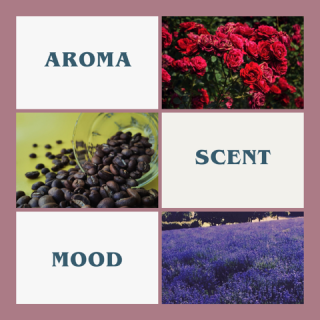Scent
How Everyday Smells Can Hack a Bad Mood
New research suggests scents may offer a key to feeling better.
Posted February 26, 2024 Reviewed by Michelle Quirk
Key points
- Smells travel directly to the limbic system, possibly offering a shortcut to mood.
- Study participants were able to be more specific about olfactory than about verbal memory cues.
- Specific (vs. vague) memories are better associated with improved mood.

Smell the proverbial roses and enjoy life, right? A new study1 shows scents actually offer a subtle, simple mood hack, especially for those who are depressed.
Kymberly Young, a neuroscientist at the University of Pittsburgh (and colleagues) study autobiographical memories: what we remember about our own histories. She knew that people suffering depression tend to wash out memories, making them general and vague, and not in a good way. Depressed patients complain of being mired in murky “brain fog,” tending to focus on negative, gray memories, even if these memories are inaccurate2 as well as overgeneralized.3
What this means in real time is that people who are depressed tend to remember more abstractly, as well as negatively. Thoughts tend toward garbage-pail generalizations like: “I’m not going anywhere in life”; “I’m a bad partner”; “My friends never reach out to me”; or “Just another failure; that’s all I do.” This negative self-talk promotes a vicious cycle: The more we tell ourselves bad things, the more we believe them and the worse we feel. Then we generate more negative thoughts and self-talk that further “prove” our negative cognitions are true.
But that’s all wrong.
Verbal vs. Olfactory Prompts
How can smelling the roses help? To recap, overgeneral, vague memories are associated with negative mood, and more specific memories are connected to positive mood (and even possibly useful in improving negative mood4,5). Young set out to test whether verbal prompts—the same language we use for negative self-talk—are more or less effective than olfactory, or odor, prompts in stimulating mood-enhancing specific memories.
Odors “hack” directly into our limbic, or emotional brains, going straight to the amygdala. Language, on the other hand, takes longer to process, traveling through our prefrontal, or thinking, cortex of the brain first, then to the limbic system.1 Could scents directly provoke specific, mood-enhancing memories better than words and thus improve mood?
Young took 32 adults with major depressive disorder and gave them 24 randomized cues. Twelve cues were verbal (e.g., the words “tomato,” or “medicine”), and 12 were actual scents in small, nontransparent vials (e.g., ketchup or cough syrup). Following each of the 24 prompts, participants were asked to recount a specific memory about that particular cue. For instance, “vanilla” (the word or scent) might prompt, “I remember making shortbread cookies with my aunt as a kid, right before Halloween.” Patients reported significantly more specific (i.e., potentially mood-enhancing) memories with odors than verbal prompts. (Perhaps this is why so many people believe in “aromatherapy”: It works!)
How to Use Smells
If you feel down, or simply find yourself relapsing into negative self-talk, smell the roses…and the ketchup and coffee grounds and cloves and oranges and coconuts and Vicks VapoRub and cumin (all prompts Young used in her study—feel free to add your own).
After you choose a scent, spend a moment really inhaling it, savoring the smell. Remember that tangerine tree you used to visit after school for snacks and succor, how you tore away the soft peel and inhaled the spray of fresh fruit. Or the last time you went to a coffee shop with a friend and smelled that acrid, fresh coffee scent and warm, yeasty pastries. Maybe clove tea cookies accompany a favorite holiday memory, or you love to pluck mint, straight from the plant in the garden.
Remember the specifics, the little details. Infuse yourself with the aroma as well as the memories. It only takes a moment and will hopefully tell the lie to any general, negative self-talk we sometimes slip into. You’re not a failure—no way; you’re simply having a bad day.
Just reading about specific aromas and letting them spark memories may enhance your mood. Young’s work suggests that smelling the actual ink or soap or lavender may make you feel even better.
Remember not so long ago when you and your child (or partner or friend or parent) went to the beach? Or the park? That smell of the breeze and spray or lap of water, the sprinkle and distinctive scent of the rain? The smile on the other person’s face and affection crinkling their eyes, the sound of their laughter? Yes, that. Exactly.
References
1. Leiker EK, Riley E, Barb S, Lazzaro SK, Compère L, Webb C, et al. Recall of Autobiographical Memories Following Odor vs Verbal Cues among Adults with Major Depressive Disorder. JAMA Netw Open. 2024;E2355958.
2. Joormann J, Teachman BA, Gotlib IH. Sadder and Less Accurate? False Memory for Negative Material in Depression. J Abnorm Psychol. 2009;118(2):412–417.
3. Williams JMG. Capture and rumination, functional avoidance, and executive control (CaRFAX): Three processes that underlie overgeneral memory. Vol. 20, Cognition and Emotion. 2006. p. 548–568.
4. Barry TJ, Sze WY, Raes F. A meta-analysis and systematic review of Memory Specificity Training (MeST) in the treatment of emotional disorders. Behaviour Research and Therapy. 2019 May 1;116:36–51.
5. Hallford DJ, Yeow JJE, Fountas G, Herrick CA, Raes F, D’Argembeau A. Changing the future: An initial test of Future Specificity Training (FeST). Behaviour Research and Therapy. 2020 Aug 1;131:103638.


